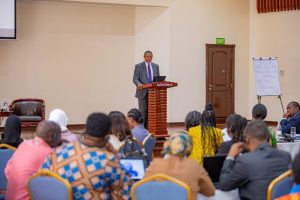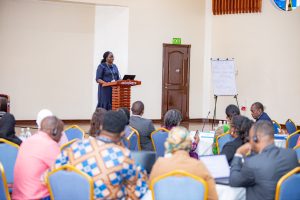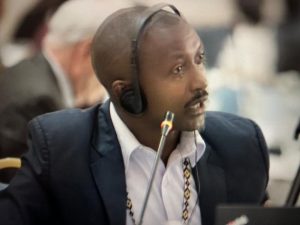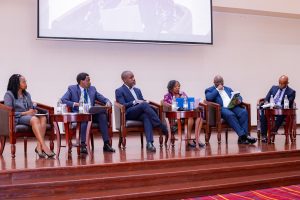 East Africa, the Horn of Africa, and the Great Lakes region are home to 5.46 million refugees and asylum seekers, as well as 19.6 million internally displaced persons.
East Africa, the Horn of Africa, and the Great Lakes region are home to 5.46 million refugees and asylum seekers, as well as 19.6 million internally displaced persons.
Traditionally viewed through a humanitarian lens, these communities are now recognized as dynamic economic actors with largely untapped potential. They contribute through their diverse skills, entrepreneurial spirit, and unique market perspectives.
Often, they develop innovative solutions to local challenges. Their presence has transformed many host areas into vibrant economic hubs, giving rise to new markets and trade routes that transcend national borders.
Recent market analyses highlight promising opportunities. In Uganda, for instance, refugees contribute 3% to the national GDP. In Kenya’s Turkana County, their presence has led to a 3.4% increase in overall employment and a 6% rise in per capita income.
 However, these communities, often located in remote and underserved areas, face limited economic opportunities and remain largely dependent on humanitarian aid. While there is growing consensus on the importance of promoting inclusive markets and businesses to support post-conflict recovery, a significant gap remains between initiatives aimed at improving economic opportunities for refugee and returnee women, and those creating an environment conducive to the growth of the private sector.
However, these communities, often located in remote and underserved areas, face limited economic opportunities and remain largely dependent on humanitarian aid. While there is growing consensus on the importance of promoting inclusive markets and businesses to support post-conflict recovery, a significant gap remains between initiatives aimed at improving economic opportunities for refugee and returnee women, and those creating an environment conducive to the growth of the private sector.
To address these challenges, the African Development Bank is funding a workshop as part of the “Regional Program for Improving the Investment Climate for the Economic Empowerment of Refugee, Returnee Women and Host Communities,” targeting East Africa, the Horn of Africa, and the Great Lakes region.
The project is implemented by the UNHCR Regional Office covering East Africa, the Great Lakes, and the Horn of Africa.
“Engaging discussions have taken place with governments, regional economic communities, partners, and refugees themselves to accelerate private sector investment in refugee-hosting areas. There is strong energy and genuine determination to capitalize on successes, seize opportunities, and enable our sisters and brothers to contribute economically and thrive,” said Mamadou Dian Balde, UNHCR Regional Director, during a high-level workshop on this project held in Nairobi, Kenya, from November 19 to 21, 2024.
The “Forum pour la Memoire Vigilante (FMV)”, an organization created and led by refugees in Rwanda, was represented by its Chief Executive Officer (CEO), Révérien Gahimbare, a civil electromechanical engineer and renewable energy expert.
 Mr. Gahimbare presented the origin of FMV and the organization’s experience in the humanitarian field, particularly its work with refugees in Rwanda. He outlined the main areas of intervention, including education, health, energy and the environment, languages and cultures, communication, and protection. He also highlighted FMV’s key achievements in these sectors since its creation, with a particular focus on actions in support of refugees.
Mr. Gahimbare presented the origin of FMV and the organization’s experience in the humanitarian field, particularly its work with refugees in Rwanda. He outlined the main areas of intervention, including education, health, energy and the environment, languages and cultures, communication, and protection. He also highlighted FMV’s key achievements in these sectors since its creation, with a particular focus on actions in support of refugees.
The CEO of FMV took the opportunity to express his profound gratitude to the Rwandan government for welcoming many refugees from the region as well as from more distant countries. He praised the establishment of a legal framework that enables refugees and immigrants to create national organizations, businesses, cooperatives, and associations, thus fostering their self-development and contribution to the development of host communities. He also thanked UNHCR for its technical support and continuous efforts in strengthening the organization’s capacity. Finally, he warmly thanked the organizers of this important regional workshop.
Révérien Gahimbare stated that the idea of a regional program aimed at improving the investment climate for the economic empowerment of refugees, returnees, and host communities was particularly relevant and timely. He passionately reminded everyone that “a refugee is a normal person in an abnormal situation.”
As a recommendation to the high-level institutions present, he emphasizing that, given the realities on the ground, refugee-led organizations play a crucial role in strengthening the resilience of vulnerable communities, including refugees, returnees, and internally displaced persons. He stressed the importance of providing them with financial, material, and technical support, particularly through mentorship and advocacy.
Alongside FMV’s participation, representatives from Tanzania, Kenya, Ethiopia, Djibouti, Rwanda, Burundi, Somalia, South Sudan, and Uganda were also present. These included activists from host and refugee communities, government representatives, regional bloc officials, and civil society and environmental stakeholders.
 This program, covering 11 countries in the region, is implemented by UNHCR in partnership with the Intergovernmental Authority on Development (IGAD) and the East African Community (EAC). Its main objective is to identify and address legal, regulatory, procedural, and infrastructure barriers hindering the economic empowerment of refugee and returnee communities. The program also aims to identify sectors with a competitive advantage for investment and trade in areas hosting these populations.
This program, covering 11 countries in the region, is implemented by UNHCR in partnership with the Intergovernmental Authority on Development (IGAD) and the East African Community (EAC). Its main objective is to identify and address legal, regulatory, procedural, and infrastructure barriers hindering the economic empowerment of refugee and returnee communities. The program also aims to identify sectors with a competitive advantage for investment and trade in areas hosting these populations.
The high-level regional meeting builds upon a series of program activities, including scoping missions, community consultations, and public-private dialogues in the targeted countries. It provides an opportunity to assess progress in the economic and financial inclusion of forcibly displaced communities and identify opportunities to strengthen the investment climate in strategic sectors, both nationally and regionally.
This meeting aims to leverage best practices, policies, partnerships, and programs in collaboration with governments, regional economic communities, international organizations, and private and financial sector actors. The goal is to define concrete measures to promote the economic and financial inclusion of displaced persons and host communities, with a particular focus on empowering women in the region.
